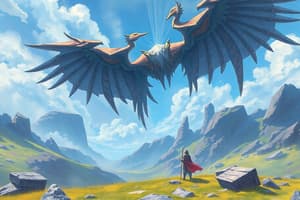Podcast
Questions and Answers
Sculpture involves the arrangement of figurative segments using materials such as steel and marble.
Sculpture involves the arrangement of figurative segments using materials such as steel and marble.
True (A)
Combined arts are limited to only visual mediums and do not include auditory elements.
Combined arts are limited to only visual mediums and do not include auditory elements.
False (B)
The term 'medium' originates from a Greek word that signifies an artist's technique.
The term 'medium' originates from a Greek word that signifies an artist's technique.
False (B)
Two-dimensional art exclusively refers to media that can be both seen and heard.
Two-dimensional art exclusively refers to media that can be both seen and heard.
Visual arts comprise both dimensional and three-dimensional artworks.
Visual arts comprise both dimensional and three-dimensional artworks.
An artist's ability to handle materials easily has no impact on the quality of the finished work of art.
An artist's ability to handle materials easily has no impact on the quality of the finished work of art.
The physical characteristics of each medium do not affect the techniques used by artists.
The physical characteristics of each medium do not affect the techniques used by artists.
An artist's technique in one medium can be expected to be identical to his technique in another medium.
An artist's technique in one medium can be expected to be identical to his technique in another medium.
For a craftsman, the technique utilized is considered a means to an end.
For a craftsman, the technique utilized is considered a means to an end.
Technique is an irrelevant aspect when distinguishing between art and craft.
Technique is an irrelevant aspect when distinguishing between art and craft.
Flashcards are hidden until you start studying
Study Notes
Medium and Technique
- Medium refers to the material artists use to convey their ideas, derived from the Latin word medium.
- Technique is how an artist controls the medium to produce desired effects in their work.
Types of Arts
-
Visual Arts: Medium can be seen and occupies space. Divided into:
- Two-dimensional: Includes painting, drawing, printmaking, and photography.
- Three-dimensional: Includes sculpture, architecture, landscape design, community planning, industrial designs, and crafts.
-
Auditory Arts: Medium can be heard and expressed in time, primarily comprising music and literature.
-
Combined Arts: Medium can be both seen and heard, existing in both space and time. Examples include dance, opera, drama, and film, collectively called performing arts.
Role of the Artist
- Artists select mediums based on their ability to express concepts effectively.
- An artist may utilize multiple mediums to enrich their creative work.
- Familiarity and respect for the chosen medium are crucial for skill improvement and artistic expression.
Characteristics of Mediums
- Each medium possesses unique characteristics that define the artwork's final appearance.
- Different materials allow for various techniques; for example, wood can be intricately carved, enhancing sculpture details.
Artist's Technique
- Technique varies significantly among artists, even when utilizing the same medium.
- Musicians, for instance, develop abilities to produce desired sounds, showcasing their unique techniques.
Distinction Between Arts and Crafts
- The distinction lies in the use of technique; in art, technique serves as a means to express ideas, while in crafts, it often serves as the end goal.
- This relationship emphasizes the importance of technique in differentiating artistic expression from craftsmanship.
Studying That Suits You
Use AI to generate personalized quizzes and flashcards to suit your learning preferences.




